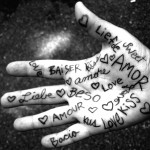Loving Someone You Would Like to Love
 “One word frees us of all the weight and pain of life: That word is love.” – Sophocles, 496-406 B.C. You’ve been told by teachers, counselors, relationship experts, self help experts, or religion, that you should at least love your family, friends, and others who are important to you. Though you and I know, it’s not that easy! It is hard to love someone who hurts you. At times you’d rather punch a family member in the face to knock them out so you can live in peace. What is Love?
“One word frees us of all the weight and pain of life: That word is love.” – Sophocles, 496-406 B.C. You’ve been told by teachers, counselors, relationship experts, self help experts, or religion, that you should at least love your family, friends, and others who are important to you. Though you and I know, it’s not that easy! It is hard to love someone who hurts you. At times you’d rather punch a family member in the face to knock them out so you can live in peace. What is Love?
Just hearing about the subject of “love” at times gets me cringing. Love gets twisted by society, not just younger generations who are often picked on in this area, into a form that destroys its most pure meaning. People think they are in “love” because they feel attraction or have been in a relationship for many years. Feelings of affection or attraction are a type of love, but they do not comprehend pure love.
Psychologist Robert Sternberg developed the triangular theory of love. The theory is applicable for interpersonal relationships. It categorizes love using three scales: 1) Intimacy, 2) Passion, and 3) Commitment. Basically, variances in the three scales produce different types of love. It is only when all three are present that a pure form of love, known as “consummate love”, can develop. Consummate love is the ultimate form of love an individual can desire.
A more applicable description of love to the style of love I’m writing about is explained by Susan Hendrick and Clyde Hendrick in their love attitude scale:
- Eros love is based on physical appearance. It describes superficial love.
- Ludus love is a game based on conquest. Pick-up artists (PUAs) often experience this type of love.
- Storge love is gradually built from similarities and friendship. The transition from friendship to love is often unclear.
- Pragma love is more rational than other type of loves as it is based on practicality. An extreme form of Pragma love is prostitution because of the rationalizing financial gains.
- Mania love is very possessive and unstable. Strong feelings of insecurity, neediness, and jealously are experienced.
Agape love is selfless, unconditional, and often spiritual.
 Love is everywhere we go. “Although humans inherit a biological bias that permits them to feel anger, jealousy, selfishness and envy, and to be rude, aggressive or violent,” says Harvard psychologist Jerome Kagan, “they inherit an even stronger biological bias for kindness, compassion, cooperation, love and nurture.” It is your choice as to whether you see the abundance of love because it is real. It is also your choice as to whether you use your biological gift of compassion and love to bring an abundance of love into your life. “Only when we give joyfully, without hesitation or thought of gain,” says love expert Leo Buscaglia, “can we truly know what love means.” That is love.
Love is everywhere we go. “Although humans inherit a biological bias that permits them to feel anger, jealousy, selfishness and envy, and to be rude, aggressive or violent,” says Harvard psychologist Jerome Kagan, “they inherit an even stronger biological bias for kindness, compassion, cooperation, love and nurture.” It is your choice as to whether you see the abundance of love because it is real. It is also your choice as to whether you use your biological gift of compassion and love to bring an abundance of love into your life. “Only when we give joyfully, without hesitation or thought of gain,” says love expert Leo Buscaglia, “can we truly know what love means.” That is love.
